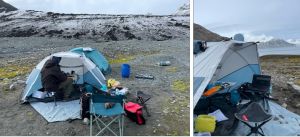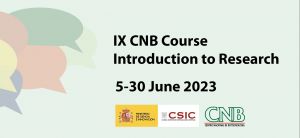
Roberto Solano receives the Silver Medal of the International Plant Growth Substances Association (IPGSA
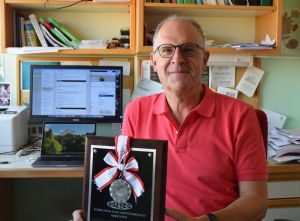
Roberto Solano has been awarded the Silver Medal of the International Plant Growth Substances Association (IPGSA). This medal recognises the contributions made in the study of plant hormones, and specifically, the contributions of Solano's group in the dissection of the biosynthesis and signalling pathways of jasmonates, essential hormones for plants´ response to stress.
Solano expressed his gratitude for the recognition and emphasised that "it is an honour and a pleasure to have been awarded the IPGSA medal".
In addition to Solano, the IPGSA has awarded researchers Caren Chang from the University of Maryland in the USA and Eva Benková, from the Austrian Institute of Science and Technology. The awards were presented at the 24th edition of the IPGSA Triennial Conference, held in Korea last July, and they will be featured speakers at the next edition of the conference.IPGSA Conference
This conference, which celebrated its 24th edition this year, is held every three years on a different continent and is a great opportunity to learn about the latest advances in related areas of plant sciences and to promote international collaborations. Presentations highlight the roles of plant growth hormones and their involvement in all aspects of pioneering plant biology.
Equivalencias matemáticas ofrecen una nueva vía para alcanzar la inmunidad de grupo ante futuras epidemias

- El estudio del CSIC señala que la inmunidad atenuante, más sencilla de conseguir, puede lograr el mismo efecto que la inmunidad esterilizante
- Los resultados obtenidos consideran la protección de infecciones pasadas ante patógenos futuros, incluso cuando se trata de cepas distintas
Un trabajo realizado por los investigadores Iker Atienza y Luís F. Seoane encuentra una equivalencia matemática entre modelos de inmunidad esterilizante (cuando el virus no puede reinfectar, ni siquiera de forma leve) e inmunidad atenuante (que no bloquea la infección, sino que solo la hace menos probable o suaviza los síntomas) ante epidemias. Según los científicos, estas equivalencias matemáticas revelan que la inmunidad atenuante, más sencilla de conseguir, es “un arma valiosa para alcanzar la inmunidad de grupo”. El estudio se publica en la revista Chaos, Solitons & Fractals.
El CSIC transfiere a la OMS sus avances en el desarrollo de la vacuna covid-19 de investigadores del CNB
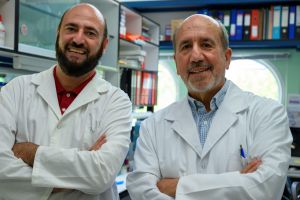
- Un acuerdo con la organización de salud pública Medicines Patent Pool (MPP), respaldado por las Naciones Unidas y supervisado por la OMS, facilitará que esta tecnología llegue a los países de bajos recursos
- El CSIC no cobrará regalías por la explotación de su vacuna siempre que se fabrique para países incluidos en la lista de países con ingresos bajos o medios
- Tras los test serológicos, es la segunda vez que el CSIC pone una tecnología a disposición de la iniciativa C-TAP de la OMS para compartirla y producirla a precio asequible
El Consejo Superior de Investigaciones Científicas (CSIC), organismo dependiente del Ministerio de Ciencia e Innovación, pone a disposición de los países en vías de desarrollo su prototipo de vacuna covid-19 basada en el virus vaccinia MVA como vector desarrollada por investigadores del CNB-CSIC. La institución ha firmado un segundo acuerdo con la organización de salud pública Medicines Patent Pool (MPP), respaldada por la Organización de las Naciones Unidas (ONU), y bajo supervisión de la Organización Mundial de la Salud (OMS) que facilitará que esta tecnología avance a ensayos clínicos y llegue a los países más necesitados. Tras los test serológicos de covid-19, es la segunda vez que el CSIC cede una tecnología a través de la iniciativa COVID-19 Technology Access Pool (C-TAP) de la OMS para facilitar al acceso igualitario a tecnologías sanitarias de covid-19.
La firma se enmarca en la iniciativa (C-TAP), creada por la OMS en mayo de 2020 para facilitar el acceso oportuno, igualitario y asequible a productos sanitarios de la covid-19 a través del impulso a su producción. C-TAP proporciona una ventana única mundial a las entidades que desarrollan tecnologías para hacer frente a la covid-19, como terapias, vacunas y sistemas de diagnóstico, con el objetivo de que compartan su propiedad intelectual (patentes), conocimiento y datos, con fabricantes de probada calidad mediante licencias transparentes, no-exclusivas y con voluntad de servir a la sanidad pública.
Microbial communities are more than the sum of their parts
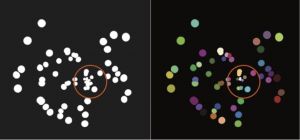
- CNB-CSIC scientists have participated in the development of an automated process to quantify species abundance and establish coexistence patterns.
- The results, published in Science, indicate the importance of the community context for understanding the origins of coexistence in complex systems.
Researchers from the Spanish National Research Council (CSIC), Delft University of Technology (The Netherlands) and Yale University (USA) have developed an automated process to quantify the abundance of bacterial species and establish patterns of coexistence and competition between those living in community. The results of their extensive analysis, published in Science, indicate the importance of the community context for understanding the origins of coexistence in complex systems, independent of the relationship between two specific bacterial species.
Open call: 9th Edition of "Science by Women" program

- 26 Spanish Research Institutes will host Senior African researchers during 2023
The Women for Africa Foundation (FMxA), in line with its mission of contributing to the development of Africa through the drive of its women, is launching the 8th Edition of SCIENCE BY WOMEN programme, with the aim to promote African women’s leadership in scientific research and technology transfer and to foster the capacity of the research centres in their home countries. The main goal is to enable African women researchers and scientists to tackle the great challenges faced by Africa through research in health and biomedicine, sustainable agriculture and food security, water, energy and climate change.
The programme´s ultimate goal is to enable African women researchers to play a leading role in the transition of Africa to a knowledge-based and innovation-led economy through research that can be transferred into products, processes, services and technologies having impact on people´s lives. To achieve this ambitious goal, FMxA collaborates with 26 Spanish Centres of Excellence, whose prestige is unanimously recognized throughout Spain and internationally, thereby ensuring excellence in scientific research in various fields.
Desarrollan un dispositivo para conocer rápidamente qué microorganismos habitan en lugares remotos
Pilar Cubas, new member of the European Molecular Biology Organisation (EMBO)

- Pilar Cubas is among the 60 new EMBO members announced today.
- This distinction is awarded annually to the world's leading scientists in recognition of the excellence of their research in the life sciences.
Madrid 4 July 2023. EMBO (European Molecular Biology Organisation) announces today the appointment of 60 new members of its organization, which includes Pilar Cubas, CNB-CSIC researcher. The new EMBO members are elected annually in recognition of their research achievements and for their contribution to scientific excellence in the field of life sciences.
This year's awardees have been recognised for contributions spanning the spectrum of life science research, including work that has demystified the immune system, advanced understanding of our senses, and facilitated innovative approaches to vaccine development.
This year sees 60 members and nine associate members elected to the EMBO Membership, of which 35 are women (51%) and 34 are men (49%). The newly elected members and associate members reside in more than 20 countries. These new additions also include Marco Milán, researcher from the Institute for Research in Biomedicine in Barcelona (IRB).
El Premio “Manuel Rico” – BRUKER de la Sociedad de Biofísica de España reconoce el trabajo desarrollado por el investigador Fernando Moreno-Herrero
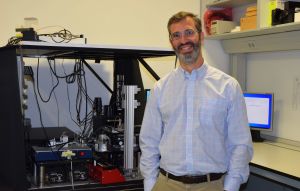
- El jurado destaca sus estudios biofísicos pioneros sobre la maquinaria molecular implicada en la reparación, organización y replicación del ADN
- El premio de este año ha sido concedido de manera conjunta al investigador del CNB y a Teresa Giráldez Fernández, profesora de la Universidad de la Laguna
Fernando Moreno-Herrero, investigador del Centro Nacional de Biotecnología (CNB-CSIC), recibe este año el Premio “Manuel Rico” Bruker de la Sociedad de Biofísica de España como reconocimiento a su trabajo pionero en el desarrollo de la biofísica molecular usando la Microscopía de Fuerzas Atómicas y las Pinzas Magnéticas.
Investigador del CNB-CSIC desde septiembre de 2009, Moreno-Herrero lidera el grupo de Biofísica Molecular de Proteínas Reparadoras de ADN. El interés principal del grupo es el desarrollo y uso de técnicas biofísicas de molécula única para estudiar propiedades mecánicas y estructura de ácidos nucleicos, así como los mecanismos de acción de máquinas moleculares de proteína involucradas en la reparación, replicación y mantenimiento del ADN.
9th CNB INTRODUCTION TO RESEARCH COURSE
Becas de introducción a la Investigación JAE Intro 2023
COOKIES POLICY
A cookie is a text file that is stored on your computer or mobile device via a web server and only that server will be able to retrieve or read the contents of the cookie and allow the Web site remember browser preferences and navigate efficiently. Cookies make the interaction between the user and the website faster and easier.
General information
This Website uses cookies. Cookies are small text files generated by the web pages you visit, which contain the session data that can be useful later in the website. In this way this Web remembers information about your visit, which can facilitate your next visit and make the website more useful.
How do cookies?
Cookies can only store text, usually always anonymous and encrypted. No personal information is ever stored in a cookie, or can be associated with identified or identifiable person.
The data allow this website to keep your information between the pages, and also to discuss how to interact with the website. Cookies are safe because they can only store information that is put there by the browser, which is information the user entered in the browser or included in the page request. You can not run the code and can not be used to access your computer. If a website encrypts cookie data, only the website can read the information.
What types of cookies used?
The cookies used by this website can be distinguished by the following criteria:
1. Types of cookies as the entity that manages:
Depending on who the entity operating the computer or domain where cookies are sent and treat the data obtained, we can distinguish:
- Own cookies: are those that are sent to the user's terminal equipment from a computer or domain managed by the editor itself and from which provides the service requested by the user.
- Third party cookies: these are those that are sent to the user's terminal equipment from a machine or domain that is not managed by the publisher, but by another entity data is obtained through cookies.
In the event that the cookies are installed from a computer or domain managed by the editor itself but the information collected by these is managed by a third party can not be considered as party cookies.
2. Types of cookies as the length of time that remain active:
Depending on the length of time that remain active in the terminal equipment can be distinguished:
- Session cookies: cookies are a type designed to collect and store data while the user accesses a web page. Are usually used to store information that only worth preserving for the service requested by the user at any one time (eg a list of products purchased).
- Persistent cookies: cookies are a type of data which are stored in the terminal and can be accessed and treated for a period defined by the head of the cookie, and can range from a few minutes to several years.
3. Cookies types according to their purpose:
Depending on the purpose for which the data are processed through cookies, we can distinguish between:
- Technical cookies: these are those that allow the user to navigate through a web page or application platform and the use of different options or services it exist as, for example, control traffic and data communication, identify the session, access to restricted access parts, remember the elements of an order, make the buying process an order, make an application for registration or participation in an event, use security features while browsing store content for dissemination videos or sound or share content via social networks.
- Customization cookies: these are those that allow the user to access the service with some general characteristics based on a predefined set of criteria in the user terminal would eg language, the type of browser through which you access the service, the locale from which you access the service, etc.
- Analysis cookies: they are those that allow the responsible for them, monitoring and analyzing the behavior of users of the web sites that are linked. The information gathered through such cookies are used in measuring the activity of web sites, application or platform and for the profiling of user navigation of such sites, applications and platforms, in order to make improvements function data analysis how users use the service.
Management tool cookies
This Website uses Google Analytics.
Google Analytics is a free tool from Google that primarily allows website owners know how users interact with your website. Also, enable cookies in the domain of the site in which you are and uses a set of cookies called "__utma" and "__utmz" to collect information anonymously and reporting of website trends without identifying individual users..
For statistics of use of this website use cookies in order to know the level of recurrence of our visitors and more interesting content. This way we can concentrate our efforts on improving the most visited areas and make the user more easily find what they are looking for. On this site you can use the information from your visit for statistical evaluations and calculations anonymous data and to ensure the continuity of service or to make improvements to their websites. For more details, see the link below privacy policy [http://www.google.com/intl/en/policies/privacy/]
How to manage cookies on your computer: disabling and deleting cookies
All Internet browsers allow you to limit the behavior of a cookie or disable cookies within settings or browser settings. The steps for doing so are different for each browser, you can find instructions in the help menu of your browser.
If you decline the use of cookies, since it is possible thanks to the preferences menu of your browser or settings, reject, this website will continue to function properly without the use of the same.
Can you allow, block or delete cookies installed on your computer by setting your browser options installed on your computer:
- For more information about Internet Explorer click here.
- For more information on Chrome click here.
- For more information about Safari click here.
- For more information about Firefox click here.
Through your browser, you can also view the cookies that are on your computer, and delete them as you see fit. Cookies are text files, you can open and read the contents. The data within them is almost always encrypted with a numeric key corresponding to an Internet session so often has no meaning beyond the website who wrote it.
Informed consent
The use of this website on the other hand, implies that you paid your specific consent to the use of cookies, on the terms and conditions provided in this Cookies Policy, without prejudice to the measures of deactivation and removal of cookies that you can take, and mentioned in the previous section.

